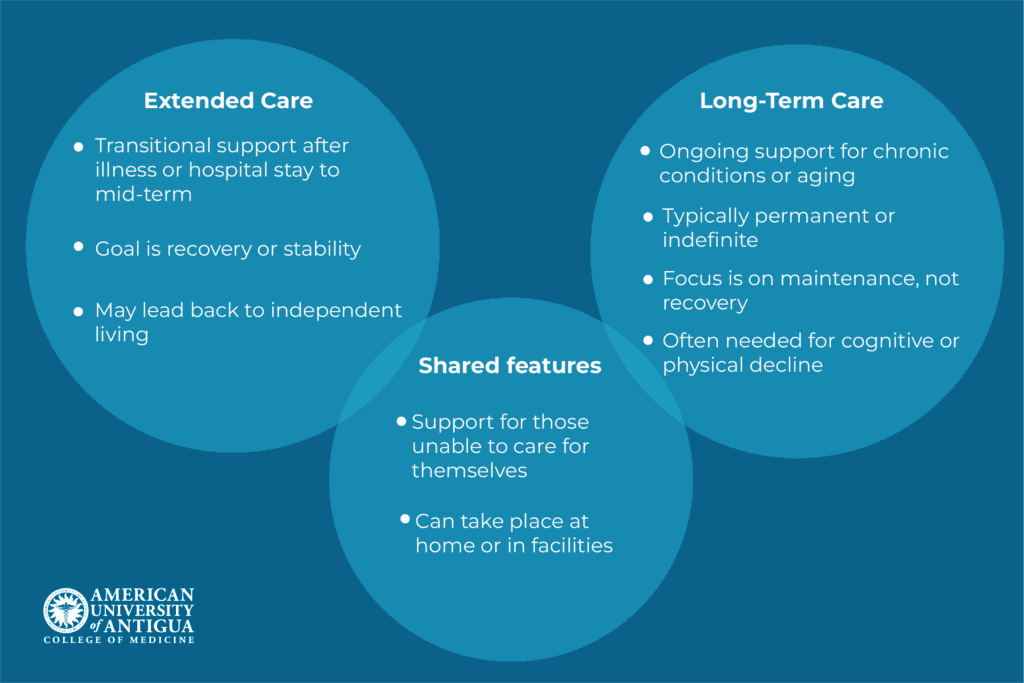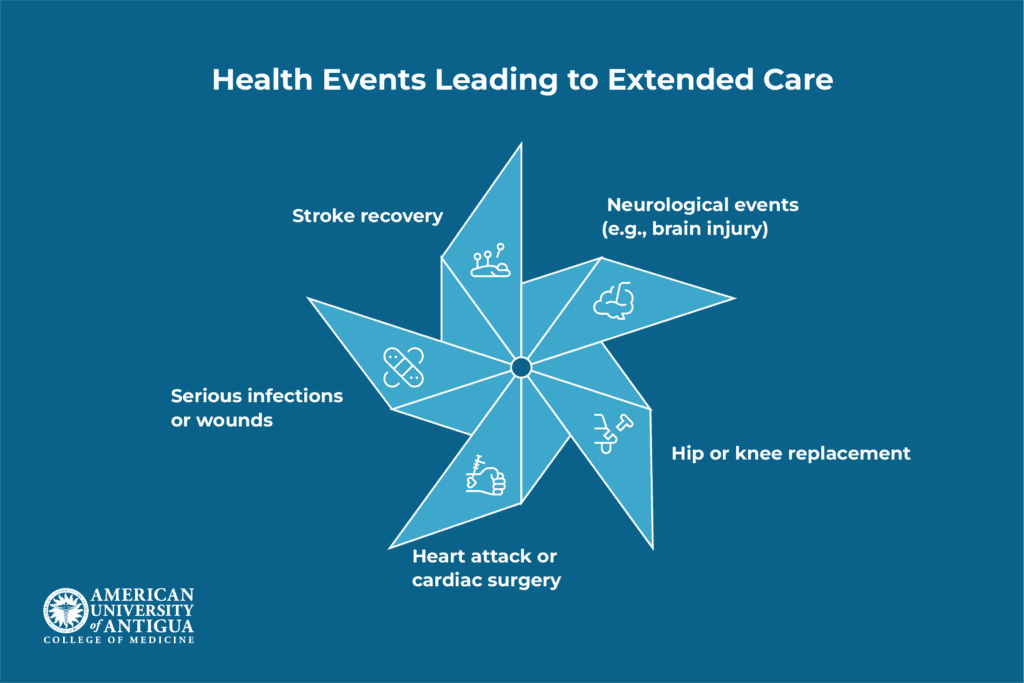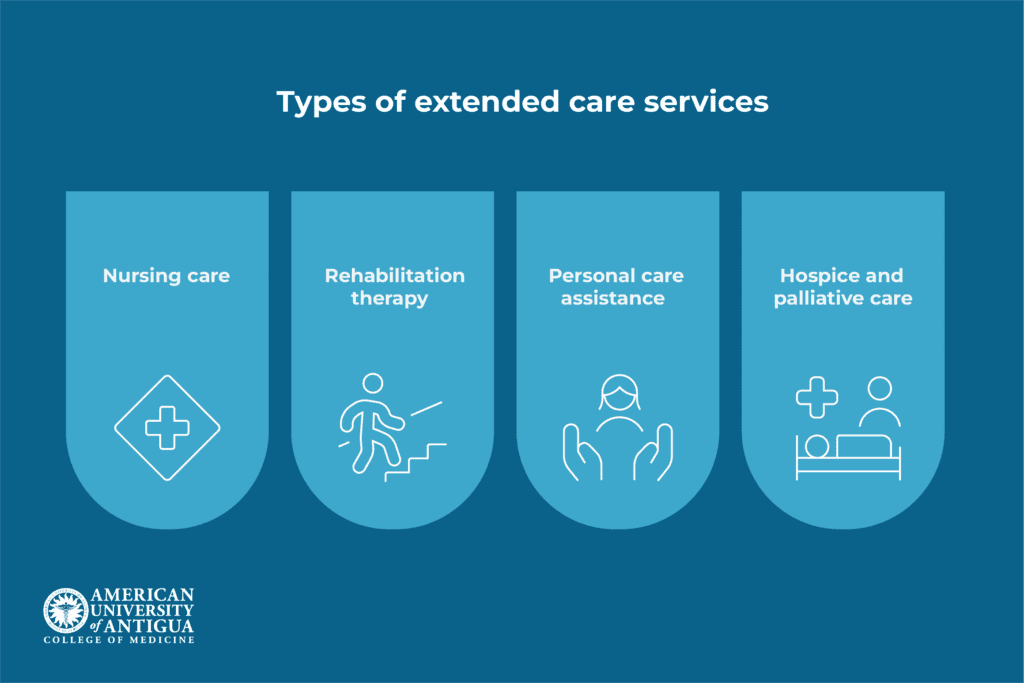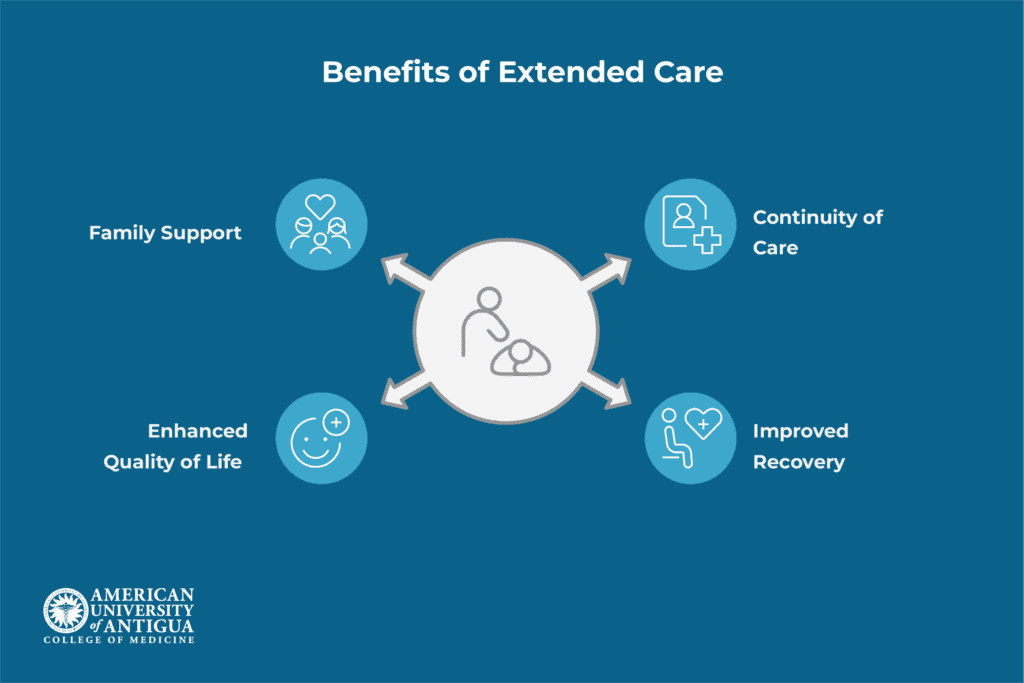What Is Extended Care? Services, Benefits, & Who Needs It
Key Takeaways
- Extended care provides ongoing support for people who need help after illness, surgery, or injury.
- The teams that provide extended care include doctors, nurses, therapists, and other caregivers.
- The duration of extended care depends on recovery progress and the goal of restoring independence or ensuring comfort.
There are times in life when people, due to age, the nature of their injury, slow recovery, or some other reason, find themselves unable to care for themselves as they once did. They may not be critically ill nor in need of a hospital bed as they recuperate, but they’re also not ready to return home and resume daily life without help.
In these in-between moments, when independence is out of reach but full-time hospitalization isn’t needed, the healthcare system offers a special kind of support: extended care.
✅ Request information on AUA's MD program TODAY!
YOUR PATH TO SUCCESS BEGINS HERE
What Is Extended Care?
Extended care refers to ongoing medical and personal aid that is provided to individuals who are unable to fully care for themselves over, as the name suggests, an extended period of time. This type of care provides the ongoing support patients need during recovery or while living with a long-term condition.
Extended care can be delivered in various settings, including:
- Skilled nursing facilities (often called extended care facilities)
- Assisted living centers
- The patient’s own home (through home care services)
- Specialized hospice settings
Extended care vs long-term care

Extended care and long-term care are terms people sometimes use interchangeably, but they actually have different connotations in practice.
In general, extended care refers to the prolonged or transitional period of care that follows a serious illness or hospital stay. Meanwhile, long-term care is more permanent in comparison, representing ongoing support for chronic conditions or aging.
Who Needs Extended Care?
Extended care is often recommended for people who are recovering from a hospital stay. These individuals may need extra time, support, and in some cases, therapy to regain their strength, mobility, and independence in daily routines.
It’s especially common for patients who:
- Have recently had surgery, dealt with an illness, or are recovering from an injury
- Need help relearning basic tasks like walking, bathing, or dressing
- Require skilled care, such as nursing, physical therapy, or wound management, before they can live independently again
Some of the most common health events that lead to extended care include:
- Stroke recovery, where patients need time to regain movement and speech
- Hip or knee replacement, which often requires physical therapy
- Heart attack or cardiac surgery, which involves monitoring during recovery and rehabilitation
- Serious infections or wounds that need ongoing care and dressing changes
- Neurological events, such as brain injuries, which may affect movement, memory, or coordination

In all these cases, the common factor is that the person needs more support than can be provided through brief hospital stays or occasional doctor visits. Extended care fills that gap.
Types of Extended Care Services
Many services fall under the responsibilities of physicians and nurse practitioners working in extended care. We’ll explore some of the key types below.

Skilled nursing care
Extended care often involves high-level nursing services delivered by licensed nurses and medical staff, often under the supervision of physicians. Common services include:
- Wound care
- IV therapy
- Catheter care
- Pain management
- Medication administration
- Monitoring of vital signs and medical equipment
- Post-operative care
Rehabilitation therapy
Many extended care programs also offer rehabilitative therapies in order to help patients regain their strength and function. This can include:
- Physical therapy: Improves mobility, balance, and physical strength
- Occupational therapy: Re-teaches daily tasks and improves fine motor skills for independence
- Speech therapy: Addresses swallowing difficulties and speech/language issues
The goal of rehab therapy in extended care is to enhance the patient’s functional abilities and speed up recovery.
Personal care assistance
Also known as custodial care or assistance with Activities of Daily Living (ADLs), this service supports individuals with routine daily tasks they cannot perform on their own. Care aides or nursing assistants help with:
- Bathing
- Dressing
- Grooming
- Using the toilet
- Eating
- Mobility (e.g., transferring from bed to chair)
The goal is to help patients maintain hygiene, nutrition, and comfort, which are essential aspects of both recovery and quality of life.
Hospice and palliative care
For individuals with severe chronic conditions or those approaching end-of-life, extended care may include hospice or palliative services.
- Palliative care focuses on relieving pain and other distressing symptoms at any stage of a serious illness, alongside curative treatments.
- Hospice care is a form of palliative care for patients who are in the final months of life (often with a life expectancy of six months or less) and have chosen to stop curative treatments and focus on comfort.
In an extended care context, hospice and palliative care services provide compassionate support, pain relief, and emotional support for patients and their families during this difficult time.
How Does Extended Care Work?
To understand how extended care works, it helps to look at who provides the care, how long it typically lasts, and when it’s considered complete.
Care team members
Extended care is typically delivered by an interdisciplinary team – various healthcare professionals work together to create and carry out a personalized care plan for the patient.
For example, in an extended care facility or program, you will often have physicians or medical directors in charge of the medical aspects, registered nurses handling day-to-day health monitoring and treatments, therapists (speech, physical, or occupational therapy) providing rehabilitation, and aides or caregivers assisting with personal needs.
Social workers or case managers are also commonly involved in care planning and in coordinating resources or support services.
All team members communicate regularly to ensure the patient’s medical and functional needs are being met. Family members are often included in planning discussions so that care aligns with the patient’s goals and the family’s expectations.
Duration and goals
The amount of time a person must be under extended care depends on their condition and needs. It could be anywhere from a few weeks of intensive rehab to several months of nursing care, or even longer if their condition is chronic and requires ongoing attention.
Typically, extended care continues until the patient meets specific goals, which are usually set by the hospital team in collaboration with the extended care team as the patient transitions from hospital to post-acute care. For example, a stroke patient might have the goal of walking 50 feet with a walker, or a patient with a wound might aim for healing within eight weeks.
Throughout extended care, regular care plan meetings are held (often including family) to review these goals, celebrate progress, or adjust the plan as needed if the patient’s condition changes.
In some cases, if recovery isn’t possible, extended care may continue as long as needed or transition into long-term care.
Benefits of Extended Care
Extended care provides several important benefits for patients and their families by maintaining consistent support and delivering a more comprehensive level of care compared to standard outpatient care. Below, we’ve provided some of these key benefits.

Continuity of care and safety
By having health professionals supervise a patient over an extended period, there’s less chance of health issues “falling through the cracks.” Continuous monitoring and follow-up can catch problems early and prevent setbacks. This way, extended care helps reduce the risk of complications and unnecessary hospital readmissions.
Improved recovery and health outcomes
Patients in extended care often recover more effectively than they would on their own at home. Access to rehabilitation therapies and skilled nursing can shorten overall recovery time and increase the likelihood of returning to a more independent life.
Enhanced quality of life
Extended care services strive to keep patients as comfortable and supported as possible. Assistance with daily needs and managing pain or symptoms helps maintain dignity and comfort. In addition, patients benefit from social interactions with staff and fellow residents, which provides a sense of normalcy despite their circumstances.
Support for families and caregivers
Extended care is also advantageous for the patient’s families. Taking care of a loved one with serious health needs can be emotionally and physically demanding. So, when professionals step in, family caregivers get respite from the 24/7 responsibility.
Extended care teams also often educate family members on how to assist with care, what to expect, and keep them informed about the patient’s progress. This guidance and support can reduce stress and help families be more safely and confidently involved in their loved one’s care plans.
Conclusion
For future healthcare professionals, understanding extended care means recognizing that patient support doesn’t end at the hospital doors. It’s about acknowledging that there are services specifically designed to ensure that no one is left without receiving the care they need. It’s also a reminder of how noble and deeply human a medical career truly is.
If you believe extended care to be your calling, consider joining us at AUA. We prepare students to deliver care at every stage through our MD program. It’s the perfect foundation for a future where you can extend lives, offer comfort, and bring hope.
Frequently Asked Questions
How long does extended care last?
Extended care lasts as long as needed — often weeks or months after a hospital stay, but sometimes longer if recovery is slow or support is ongoing.
Is extended care the same as a nursing home?
No — nursing homes are one of the settings where extended care is provided, but extended care can also occur at home, in rehab centers, or in hospice facilities.
Can I get extended care at home?
Absolutely! Many people receive extended care at home through visiting nurses, therapists, or caregivers, as long as their condition allows for safe care outside a facility.
✅ Request information on AUA's MD program TODAY!
YOUR PATH TO SUCCESS BEGINS HERE
✅ Request information on AUA's MD program TODAY!